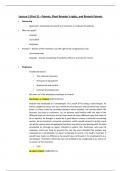Lecture 3 (Part 2) – Patents, Plant Breeder’s rights, and Biotech Patents
• Ownership
– Applicant’s nationality and country of invention is irrelevant for patents.
• Who can apply?
– Inventor
– Consultant
– Employee
• Inventor – deviser of the invention, has the right to be recognised as such.
– Joint ownership
– Disputes - may be resolved by the patents office or even by the courts.
• Employees
– Traditional factors
• Tax, national insurance
• Provision of equipment
• Supervision and control
• Contract of employment
– But even so is the employee employed to invent?
Electrolux –v- Hudson [1977] FSR 312
Hudson was employed as a storekeeper. As a result of his being a store keeper, he
had to categorise and to sort out a whole lot of connectors and put them into various
boxes so these could be provided pleasant when needed, not merely within the
business, but also to customers. So, he became very familiar with the idea of the
different kinds of connectors and as there were so many different ones that seem to
be so specific, he thought it would be a good idea to create a universal connecting
system. So he invented a universal connector, which would connect to pretty much
any of the various kinds of appliance that there was that he was dealing with. He then
proceeded to, through an agent, attempt to patent this. Electrolux, who was his
employer, tried very hard to prevent this, but the court decided that Hudson was
employed as a storekeeper, he wasn't employed to invent, if he hadn't invented, it
would have made no difference, he would have continued in his employment as a
storekeeper. Therefore, Electrolux was not entitled to be recognised as an owner or
co-owner of the invention.
• S.39
– Re Harris Patent [1985] RPC 19
, Harris was under a primary duty to sell valves and not to invent. The court applied the
three criteria above in deciding that he owed no responsibility to invent.
– Greater Glasgow Health Board’s Application [1996] RPC 207
This involved an employee of theirs, a young ophthalmologist whose functions it was
to look into people's eyes and to decide whether or not they suffered from various
kinds of disease and limited sight. He found this a very difficult thing to do. You had
to shine a light into the eyeball, and you also had to look through magnification in
order to see the retina at the back of the eyeball and this was not at that stage an
easy thing to do, the light and the appliance to look into the eye were separate. So,
the ophthalmologist decided to develop a tool which contained both the lighting and
the viewing facility in one item. That was much easier to handle and it also provided
light in exactly the spot where he was looking at the time. So, he produced this and
his employer, Greater Glasgow Health Board, decided to apply for a patent. The
ophthalmologist objected to this. It was decided that because the ophthalmologist
was not required to invent and once again, as we saw with Hudson, could easily have
carried out his duties without any fault on his part, without doing any inventing. The
court decided that Greater Glasgow Health Board was not entitled to be regarded as
owner of this patent.
• Employee compensation – s.40
– Outstanding benefit to the employer - usually understood as meaning that it
eventually provides more than 15% of the turnover of the employer's business.
– Something out of the ordinary
– Level of investment by employer in the project
– Previous dealings with the customer
– More difficult where the employee receives a salary as an inventor.
• Dealings in patents
– Assignation, mortgage, transfer – signed and in writing.
– License
– Compulsory license – if patent has been granted for 3 years.
– Grounds in s.48
• Infringement s.60
– Making, disposing, offering, using, importing, keeping
– Relates also to patented processes as well as to products.
– Indirect infringement – providing means to make or use a patent which is not owned
by you.





